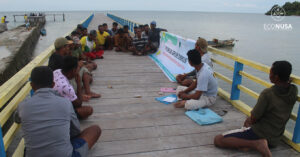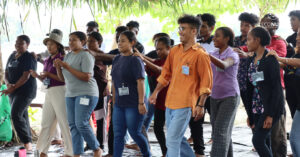
Bappenas wants to encourage a systems-based approach that is linked to efforts to secure or protect and utilize natural resources and the environment. This was conveyed by Medrilzam, Environment Director of the Ministry of National Development Planning (Bappenas) on September 9, 2020 in Manokwari, West Papua.
Bappenas endorses system-based approach in relation to the endeavors that secure, protect and make use of natural resources and environment. The statement was made by Medrilzam, the National Development Planning Agency’s Director for Environment, on 9 September 2020 in Manokwari, West Papua.
“We have started the low carbon development planning which is on implementation process of low carbon development in West Papua,” he said.
Bappenas promotes mindset shift on the arrangement of development planning from national to regional levels. A development should be regarded as an integral part and a system while giving emphasis on science.
“We in Bappenas really support the system approach and spatial approach which is based on science, because we do not want our colleague at province, regency and municipality to arrange development planning on the basis of a mere perception,” said Medrilzam.
He observed that there has been shift when policy and planning are made scientific-based (evidence-based policy). “We can create this policy in RPJMD (Regional Medium-Term Development Plan) and in kinds of sectoral planning documents so that all could be under control,” he added.
Those were addressed during the workshop entitled “Introduction to System-based Development Model in Arrangement of Low Carbon Development Sectoral Plan in West Papua” on 9-10 September 2020. The offline and virtual event organized by West Papua Province in collaboration with WRI Indonesia, EcoNusa, CIFOR, and The Asian Foundation has approved log frame of West Papua’s Low Carbon Development Plan.
“Of course this could be attained through well-planned, integrated planning strategy under all parties’ coordination,” said Nathaniel D. Mandacan, West Papua Secretary, on the event.
According to Nathaniel, strategic planning opens public and private participation with regional stakeholders involvement that could provide contribution to low carbon development.
“Our main duty is to provide untainted water spring legacy to our next generations. We should never give tears to the next generation,” he said.
The event aimed to inaugurate and commence various activities as agreed by the log frame of Low Carbon Development Plan in West Papua Province while consolidating the Low Carbon Development Plan implementation plan of each sector.
“Thus, it is expected that we do not make trial and error when working on development. But from the start we have been able to control various kinds of impact of the agreed process of planning and policy making,” Medrilzam added.
The agenda here is also intended to align the understanding on method, data and estimation technique of emission from each sector’s emission activity. The workshop participants also built technical capacity to use emission data of land use change to define reference emission level of each sector.
On the first day, West Papua’s Low Carbon Development Plan log frame was virtually approved by Bappenas’s Director of Environment and handed directly over the West Papua’s Regional Development Planning Agency (Bappeda). The first day event was led by Markus Sraun, the West Papua Province’s head for Bappeda’s Physical and Infrastructure, as the moderator.
Editor: Leo Wahyudi & V. Arnila Wulandani







